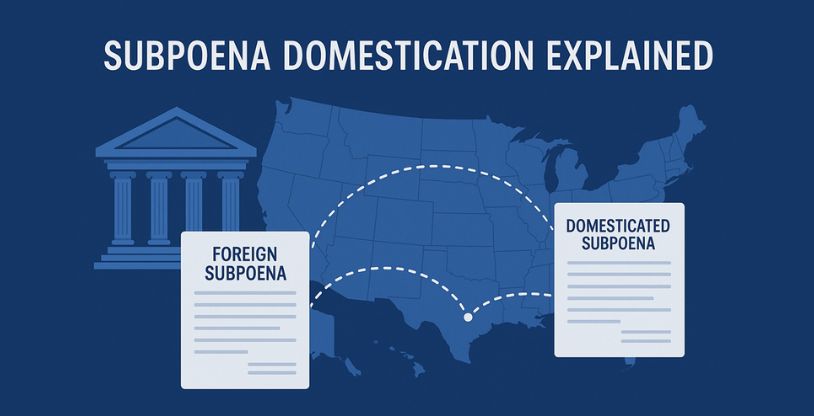Subpoena domestication is the legal process of making an out-of-state subpoena enforceable in another state. Under the UIDDA (Uniform Interstate Depositions and Discovery Act), attorneys can request that a subpoena issued in one state be reissued—or “domesticated”—in the state where the witness or records are located. This allows the local court to recognize and enforce the subpoena. Without domestication, most courts will not honor a foreign subpoena.

Countrywide Process
July 30, 2025
A subpoena is a legal document used to compel someone to appear in court, give testimony at a deposition, or produce documents relevant to a case. Attorneys use subpoenas in civil and criminal proceedings to gather the evidence needed to support their claims or defenses.
Subpoenas can be served on individuals, corporations, government agencies, or record custodians. But what happens when the person or entity being subpoenaed lives in a different state from where the case was filed?
That’s where the concept of a foreign subpoena and the process of subpoena domestication come into play.
A foreign subpoena (also called an out-of-state subpoena) is a subpoena issued in a jurisdiction outside the state where the person or records being sought are located. Most states will not recognize or enforce a subpoena issued by another state—unless it is properly domesticated.
That’s because courts need jurisdiction to enforce a subpoena. If the subpoena is from a different state and has not been filed in the local (resident) court, the local court has no authority to compel compliance, fine, or jail the noncompliant person.
To solve this jurisdictional issue, the Uniform Interstate Depositions and Discovery Act (UIDDA) was introduced. UIDDA provides a standardized process for attorneys to domesticate and serve subpoenas across state lines.
UIDDA has been enacted by 47 states, the District of Columbia, and the U.S. Virgin Islands, with only a few states remaining non-participants.
Subpoena domestication is the legal process of transforming an out-of-state subpoena into a state-recognized subpoena in the jurisdiction where the person or records are located.
Here’s how it works under UIDDA:
If the witness or deponent (the person being subpoenaed) is located within the same state as the originating case, there is no need to domesticate the subpoena. The court already has jurisdiction and can directly enforce compliance. Domestication only becomes necessary when the target of the subpoena is in another state.
Without proper domestication, an out-of-state subpoena is unenforceable. Even if you serve someone with a subpoena from your home state, if they live in a different state, they can legally ignore it unless the subpoena has been domesticated and filed in their local court.
Subpoena domestication ensures that:
Subpoena domestication, guided by UIDDA, streamlines multistate discovery and depositions. Whether you’re seeking records, testimony, or a deposition, understanding the difference between a subpoena, a foreign subpoena, and domestication is crucial for successful compliance and enforcement.
Use our online UIDDA Subpoena Form Generator to prepare and file discovery subpoenas in California—fast, secure, and attorney-friendly.
A subpoena is a legal document that requires a person to appear in court, give testimony at a deposition, or provide documents relevant to a case. Subpoenas are issued by attorneys or courts in civil and criminal proceedings.
A foreign subpoena is a subpoena issued by a court in one state but intended to be served in another state. It cannot be directly enforced by the receiving state unless it is domesticated according to that state’s laws.
Subpoena domestication is the process of making an out-of-state (foreign) subpoena legally enforceable in another state. This is done by preparing and filing a local subpoena in the state where the witness or documents are located, often under the Uniform Interstate Depositions and Discovery Act (UIDDA).
UIDDA stands for the Uniform Interstate Depositions and Discovery Act. It streamlines the process for attorneys to domesticate subpoenas across state lines by allowing the local court to issue a subpoena based on a foreign subpoena from the case’s originating state. UIDDA has been adopted by most U.S. states.
Subpoena domestication is required when the person or records being subpoenaed are located in a different state than where the case was filed. The originating subpoena must be domesticated in the recipient’s state to be enforceable.
Yes. Tools like our online subpoena form generator allow attorneys to easily prepare and domesticate UIDDA-compliant subpoenas in California and other states, saving time and ensuring compliance with local court requirements.
No, UIDDA has been enacted by 47 states, the District of Columbia, and the U.S. Virgin Islands. A few states have not adopted it and still require more complex domestication procedures.